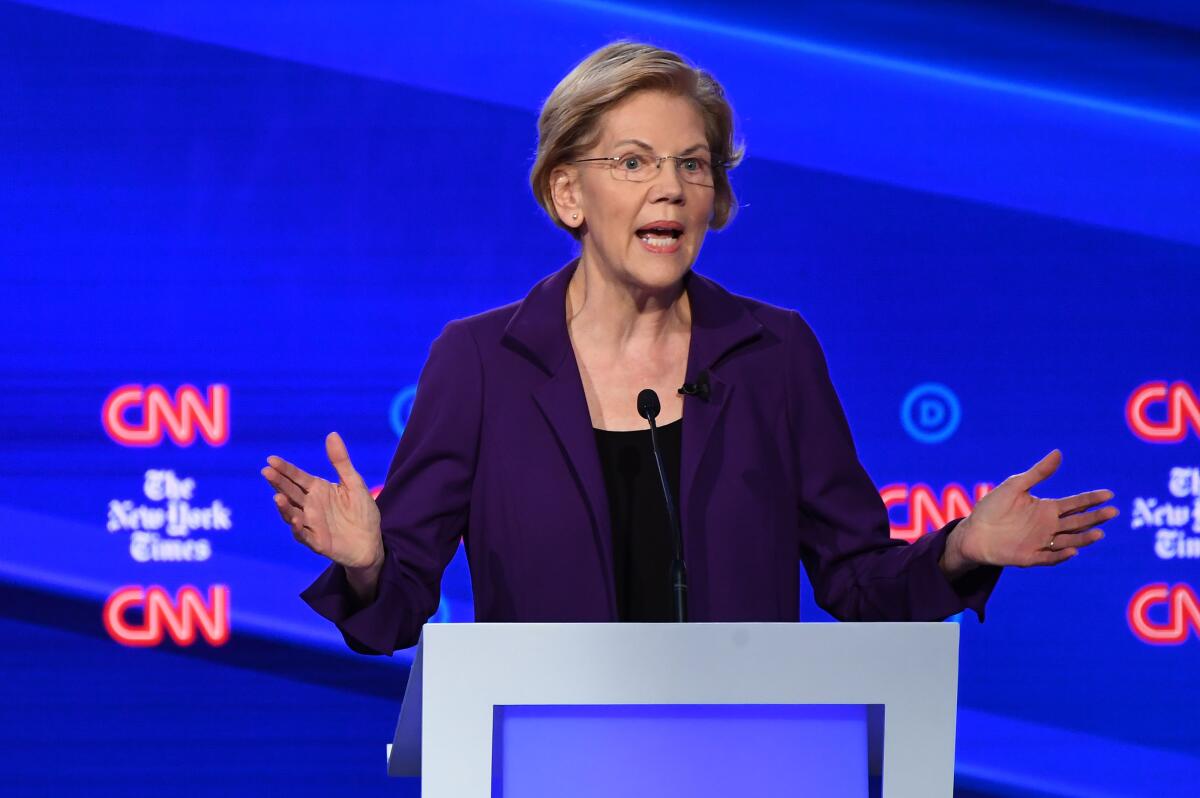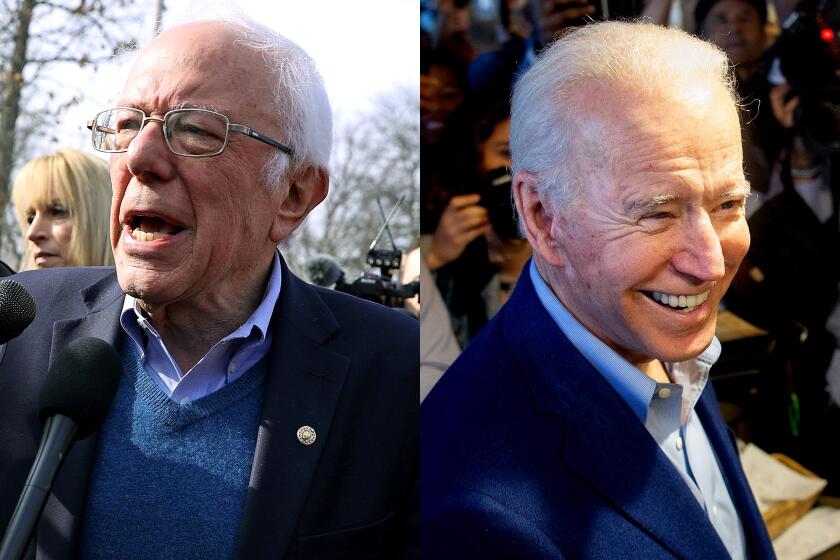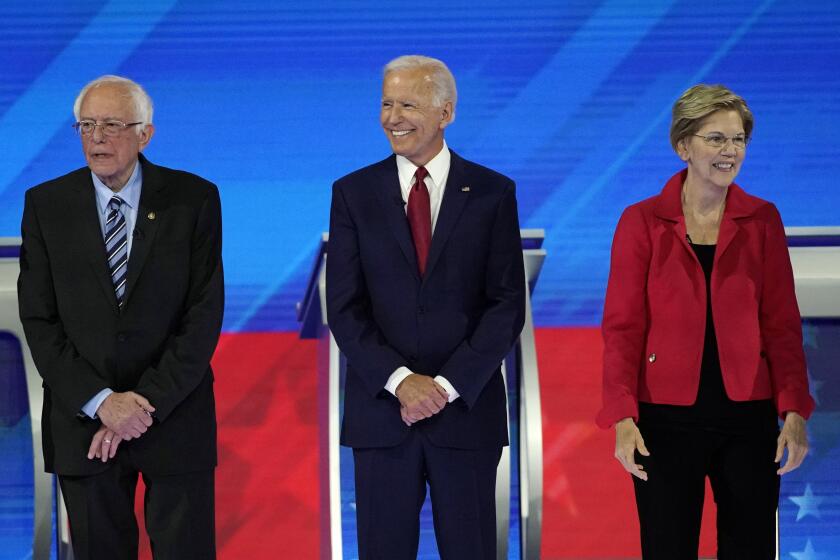Rivals in Democratic debate make clear they see Warren as the front-runner

- Share via
WASHINGTON — Welcome to the top, Elizabeth Warren.
That was a central message of the presidential Democratic debate Tuesday, when the Massachusetts senator’s rivals peppered her with hostile questions and blunt challenges to her policies on healthcare, taxes and more.
The debate was the first to be held since Warren moved into the lead of many national and early-state polls, challenging Joe Biden’s status as front-runner, and she drew fire that she had largely escaped in earlier rounds.
The spotlight illuminated both her strengths and vulnerabilities: Her responses showcased the intellectual prowess that has helped fuel her rise, but also featured the ideological edge and sometimes condescending tone that critics fear could alienate swing voters.
Sen. Amy Klobuchar of Minnesota, who clashed several times with Warren, called her out early on for seeming to suggest that Democrats who don’t agree with her ideas don’t care about the middle class.
“I think simply because you have different ideas doesn’t mean you’re [not] fighting for regular people,” said Klobuchar, who joined others in saying that Warren’s ambitious policy plans were unrealistic. “The difference between a plan and a pipe dream is something you can actually get done.”
The pushback against Warren came amid a debate that amounted to a stress test for the top-tier candidates in a race that has changed markedly since the last time they met for a debate, in mid-September.
For Sen. Bernie Sanders, the debate was a test of his stamina following a heart attack two weeks ago; he held up with a robust performance. For Joe Biden, it was a test of how he was weathering a barrage of attacks from President Trump; he brushed off a moderator’s question, and his rivals largely avoided going after the former vice president.
Instead, while the debate featured many examples of candidates lunging and parrying with each other, no one sustained as many challenges as Warren. She also drew the deference a perceived front-runner often gets, as others frequently made their own points in reference to her and her ideas.
The nature of the debate testified to how much Warren’s position has improved in recent months. Biden has remained at the top of most polls but his lead has diminished markedly and has vanished in some cases. Support for Warren has steadily risen, especially in the early-voting states of Iowa and New Hampshire, as well as in California, which will send by far the largest of any state delegation to the Democratic nominating convention next summer.
Here are key dates and events on the the 2020 presidential election calendar, including dates of debates, caucuses, primaries and conventions.
Even her rivals have admired the organization and discipline of Warren’s campaign and her success at fundraising despite her refusal to court big donors with high-dollar events — an achievement she shares with Sanders.
But many Democrats, including more moderate voters and party establishment leaders, remain worried that Warren’s agenda, including policies like the expansion of Medicare to cover all Americans, tilts too far left to win in a general election.
Pete Buttigieg, the South Bend, Ind., mayor who is trying to position himself as more moderate in tone and policy, launched a digital ad earlier in the day challenging Sanders and Warren on “Medicare for all.” At the debate, he made the case that their plans risk alienating people who want to keep their private health insurance plans.
“I don’t understand why you believe the only way to deliver affordable coverage to everybody is to obliterate private plans,” he said.
He was also one of several rivals who chided Warren for not being more specific about how Medicare for all would be paid for. Sanders has acknowledged that his version of the plan would require tax increases, although he says they would be more than offset for middle-class families by eliminating insurance premiums, deductibles and co-payments.
Warren has refused to embrace that formulation, saying that her plan would lower costs for working families, but declining to be more specific.
She budged no further in the debate., but declared: “I will not sign a bill into law that does not lower costs for middle-class families.”
Biden faulted her for not being more straightforward.
“We can’t be running any vague campaigns,” he said. “We have to level with people.”
The age and health of the top Democratic presidential candidates will come under scrutiny in Tuesday’s debate, coming after Bernie Sanders’ heart attack. Like Sanders and Joe Biden, Elizabeth Warren is in her 70s, but she flaunts her fitness.
Warren has fueled her rise with her detailed policy proposals and a warm, personable style that has quieted some of the criticism that has been leveled at her in the past as being pedantic and hard-edged.
But during the debate, she may have revived some of those concerns, as when she took swipes at fellow Democrats for not supporting her proposed tax on fortunes greater than $50 million.
“My question is not why do Bernie and I support a wealth tax. It’s why ... does everyone else on this stage think it is more important to protect billionaires than it is to invest in an entire generation of Americans?” she said.
“I understand that this is hard, but I think as Democrats we are going to succeed when we dream big and fight hard, not when we dream small and quit before we get started,” she said.
Klobuchar, who was more successful than in past debates in asserting herself as a centrist alternative, shot back:
“I want to give a reality check here to Elizabeth, because no one on this stage wants to protect billionaires,” Klobuchar said. “Not even the billionaire wants to protect billionaires,” she said, referring to Tom Steyer, a multibillionaire former hedge-fund manager, who joined the debate stage for the first time. “We just have different approaches. Your idea is not the only idea.”
An even more fraught exchange came late in the debate and pitted the two front-runners against each other after Biden asserted that he was “the only one on this stage who has gotten anything really big done,” and ticked off a list of legislative accomplishments from his long Senate career.
Warren answered the challenge by citing her work in conceiving of and pushing for the Consumer Financial Protection Bureau, which was enacted into law during the Obama administration. She bristled when Biden responded by trying to claim some of the credit for that accomplishment, saying that as vice president he had lobbied in the Senate for the measure.
“I went on the floor and got you votes,” he said.
With deliberation that seemed as if it was through gritted teeth, Warren responded, “I am deeply grateful to President Obama who fought so hard to make sure that agency was passed into law.”
Biden interjected to praise her work. She responded tersely: “Thank you.”
More to Read
Get the L.A. Times Politics newsletter
Deeply reported insights into legislation, politics and policy from Sacramento, Washington and beyond. In your inbox twice per week.
You may occasionally receive promotional content from the Los Angeles Times.













